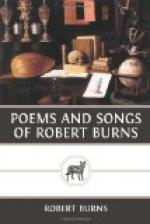Great love I bear to
a’ the fair,
Their humble slave,
an’ a’ that;
But lordly will, I hold
it still
A mortal sin to thraw
that.
For a’ that, &c.
But there is ane aboon
the lave,
Has wit, and sense,
an’ a’ that;
A bonie lass, I like
her best,
And wha a crime dare
ca’ that?
For a’ that, &c.
In rapture sweet this
hour we meet,
Wi’ mutual love
an’ a’ that,
[Footnote 1: A
later version of “I am a bard
of no regard”
in “The Jolly Beggars.”]
But for how lang the
flie may stang,
Let inclination law
that.
For a’ that, &c.
Their tricks an’
craft hae put me daft.
They’ve taen me
in, an’ a’ that;
But clear your decks,
and here’s—“The Sex!”
I like the jads for
a’ that.
For a’ that, &c.
Song—Merry Hae I Been Teethin A Heckle
Tune—“The bob O’ Dumblane.”
O Merry hae I been teethin’
a heckle,
An’ merry hae
I been shapin’ a spoon;
O merry hae I been cloutin’
a kettle,
An’ kissin’
my Katie when a’ was done.
O a’ the lang
day I ca’ at my hammer,
An’ a’ the
lang day I whistle and sing;
O a’ the lang
night I cuddle my kimmer,
An’ a’ the
lang night as happy’s a king.
Bitter in idol I lickit
my winnins
O’ marrying Bess,
to gie her a slave:
Blest be the hour she
cool’d in her linnens,
And blythe be the bird
that sings on her grave!
Come to my arms, my
Katie, my Katie;
O come to my arms and
kiss me again!
Drucken or sober, here’s
to thee, Katie!
An’ blest be the
day I did it again.
The Cotter’s Saturday Night
Inscribed to R. Aiken, Esq., of Ayr.
Let not Ambition mock
their useful toil,
Their homely joys, and
destiny obscure;
Nor Grandeur hear, with
a disdainful smile,
The short and simple
annals of the Poor.
Gray.
My lov’d, my honour’d,
much respected friend!
No mercenary bard his
homage pays;
With honest pride, I
scorn each selfish end,
My dearest meed, a friend’s
esteem and praise:
To you I sing, in simple
Scottish lays,
The lowly train in life’s
sequester’d scene,
The native feelings
strong, the guileless ways,
What Aiken in a cottage
would have been;
Ah! tho’ his worth
unknown, far happier there I ween!
November chill blaws
loud wi’ angry sugh;
The short’ning
winter-day is near a close;
The miry beasts retreating
frae the pleugh;
The black’ning
trains o’ craws to their repose:
The toil-worn Cotter
frae his labour goes,—
This night his weekly
moil is at an end,
Collects his spades,
his mattocks, and his hoes,
Hoping the morn in ease
and rest to spend,
And weary, o’er
the moor, his course does hameward bend.




